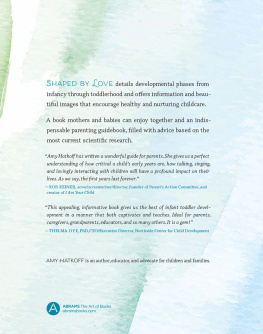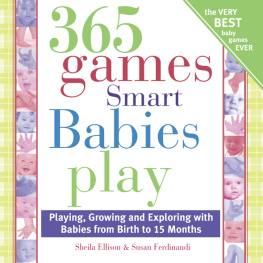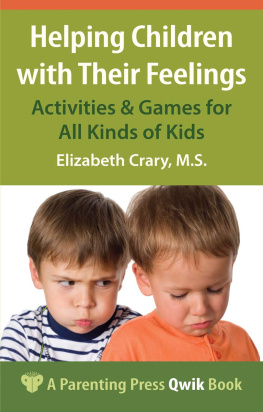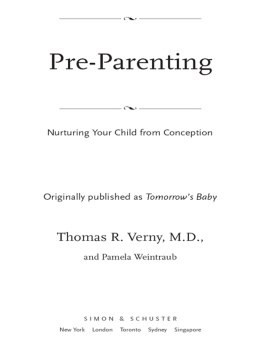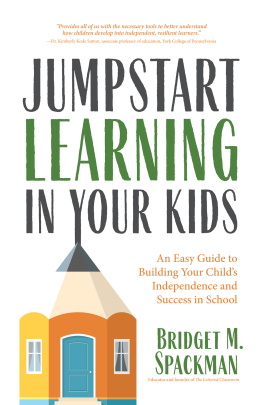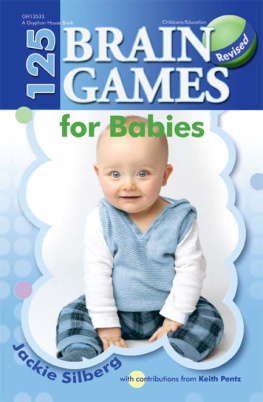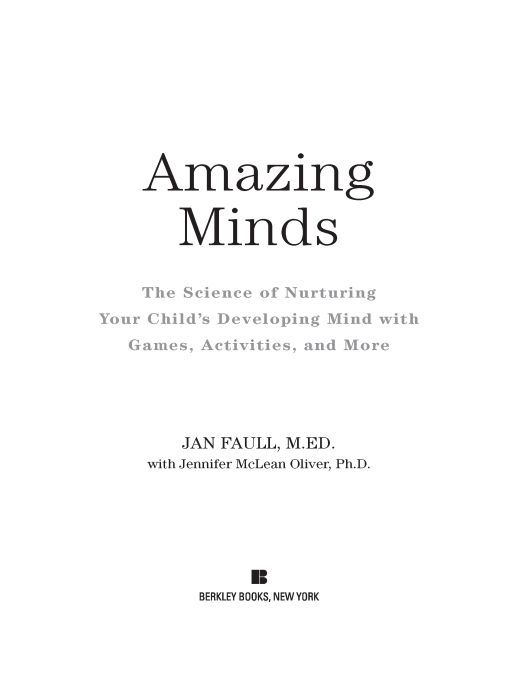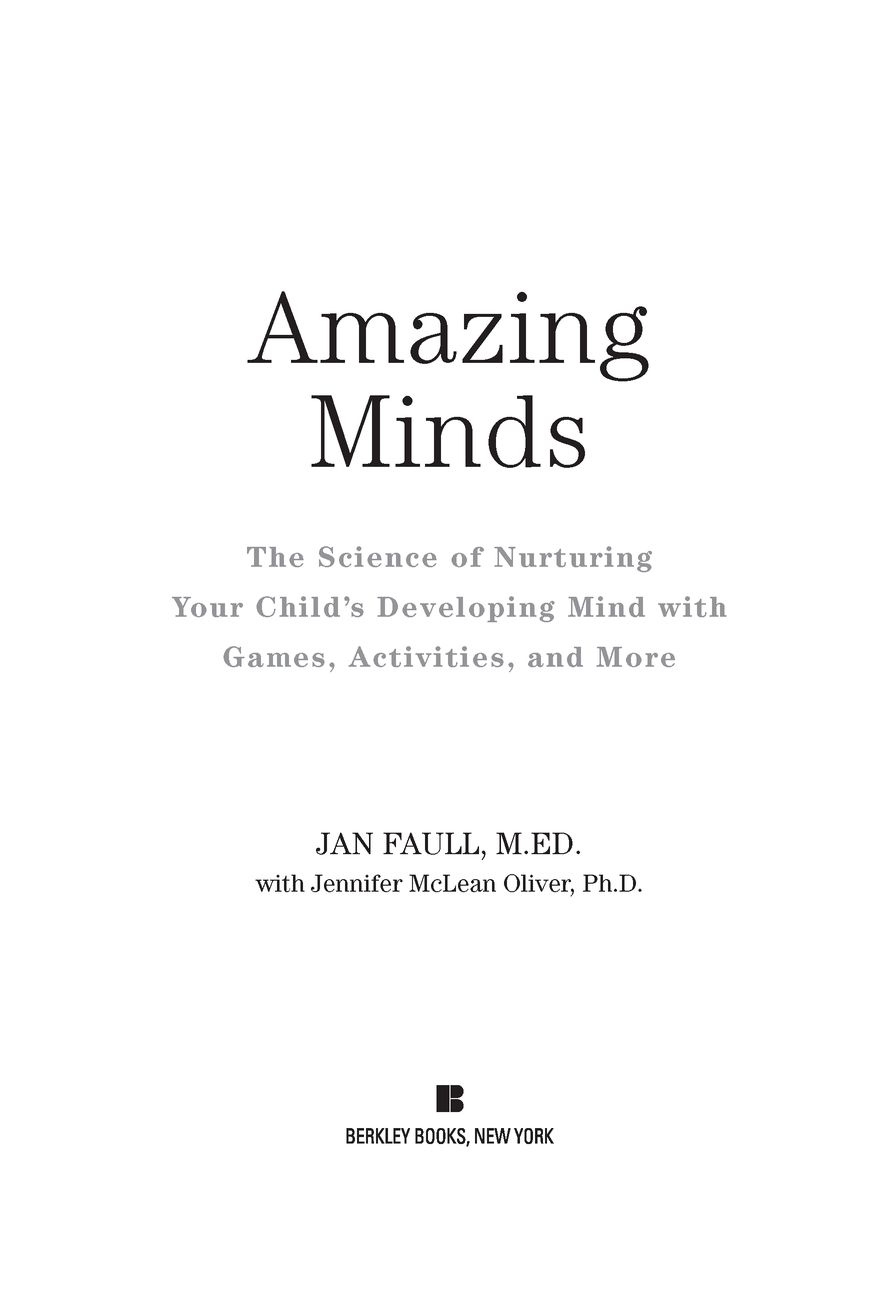Table of Contents
Most Berkley Books are available at special quantity discounts for bulk purchases for sales promotions, premiums, fund-raising, or educational use. Special books, or book excerpts, can also be created to fit specific needs.
For details, write: Special Markets, The Berkley Publishing Group, 375 Hudson Street, New York, New York 10014.
To my granddaughters, Emilia,
Flora, and Violet
Acknowledgments
During most of my career as a parent educator I focused on parents with toddlers through teens. Then in 2000 I attended a conference where Andrew Meltzoff, Ph.D. and Patricia Kuhl, Ph.D. were keynote speakers presenting information from their book written with Alison Gopnik, Ph.D., The Scientist in the Crib. That presentation inspired me to delve into research on infants and toddlers, which ultimately lead to the writing of Amazing Minds. To those three researchers and all the others referenced in this book, Im truly grateful. Their scientific investigations give a clear view of what babies and toddlers are seeking to know.
Then in 2005, 2007, and 2009 three miracles occurred in my life: the birth of three granddaughters, Emilia, Flora, and Violet, respectively. Having the privilege of witnessing their development, from the intimate relationship of grandmother to granddaughter, was not only a blessing but a personal validation of the research. Along with these three babies, I also wish to thank their parents Anna and Phil, and Jerry and Christy who are on the frontline every day nurturing these little girls development. Also to Alan, my youngest, whose development is embedded in my memory because he wrote the book on funny and challenging events as he traveled from infant to toddler to fine young adult.
The support staff involved in producing a book is far reaching, so there are many people to thank: Jennifer McLean Oliver Ph.D., my research assistant; Maura Kye-Casella, my agent; Denise Slivestro, my editor at Berkley Books; and Lexi Walters, editor at Babyzone.com. Nancy Wilson taught me how to access research articles at Suzzallo Library on the UW campus and Kathy Oberg of Highline Community College read the entire manuscript, making sure it was appropriate for community college Early Childhood Education students.
Then there are groups of friends who have been with me from the conception of this book: my professional parent education colleagues, my hiking and walking groups, my neighbors from the best neighborhood in the world, my church family, my birthday and book groups and extended family. I also want to thank PEPS (Program for Early Parent Support) who gave me the opportunity to serve on their board for the last three years.
For thirty-four years Ive been a parent educator, teaching classes, speaking, and writing for parenting audiences. Ive learned more from the parents Ive served than they have learned from me. A heartfelt thank-you to them all because they know that parenting is about big people nurturing little people so that they can be big themselves someday.
Also I want to thank Bruce and Jolene McCaw for their support of the Talaris Research Institute, where I had the opportunity to work with Andy Meltzoff and Patricia Kuhl and their research that laid the foundation for Amazing Minds.
Lastly, thank you to Terrill Chang, whose love bolstered me daily to tackle the ups and dows of writing this book.
Foreword
Discoveries from many scientific studies coming from laboratories around the world over the last several decades have revolutionized our ideas about how infants and toddlers think, learn, and develop, and word is starting to get out. Parents and others who care for children want to understand what scientists are discovering about early learning. They have a desire and responsibility to ensure their children receive the support needed during this formative period, and they want to know what they should do to provide it. These are the timely questions that are addressed in Amazing Minds.
As a scientist and co-director of the University of Washingtons Institute for Learning and Brain Sciences in Seattle, I am delighted to write the foreword of this excellent book and to endorse its goal of sharing scientific discoveries and providing interpretations and usable, practical advice, based upon the science, for the many loving parents out there who are hungry for information of this kind.
As we all know, babies are born immature. They cant speak or use tools, but very quickly they acquire these skills, and so much more, as their brains rapidly grows in size and complexity. During this time of rapid development, the brain has sensitive periods, or windows of opportunity, during which time certain parts of the brains circuitry are more malleable, more plastic, than at other times. That plasticity is what allows for the efficient and exuberant learning when the environment provides the necessary stimulation. For example, children absorb their native language and achieve fluency by age three just by listening to people talk around them and to them, something the most advanced supercomputer cannot yet accomplish. Similarly, young children learn a second language very easily during their early development. Yet, as many of us have discovered, learning a second language becomes more effortful later in life, after we pass our sensitive period for second language learning.
As children develop, they naturally seek the type of environmental stimulation that supports their learning. In Amazing Minds, Jan Faull, M.Ed. with Jennifer McLean Oliver, Ph.D., help parents recognize what children are seeking to learn at different ages and how to respond. They step through the learning agenda of the child in the first few years as he develops his senses, language, memory, reasoning skills, emotions, ability to use tools, and ability to take the perspective of another person and suggest ways, based upon the science, that parents can support that learning.
Often when parents hear about windows of opportunity for learning, they worry that there is a special product that their infant must have to maximize his or her chances of getting into Harvard or Yale at eighteen. What parents need to know is that they themselves are the childs favorite playthingthat they themselves provide just the kind of stimulation that the child needs. As is described in Amazing Minds, the important thing is that parents share time with their children, that they are responsive and talk and play with them, with patience, and at the childs pace. Simple activities such as playing peekaboo, banging on pots and pans together, naming what your child points to, and other similar activities suggested in this book, are the kind of environmental influences that provide stimulation that supports learning.
Some parents wonder: If a little stimulation is good, perhaps more is better? Again, this book helps parents find the right balance for them and their babies. What is important is that parents respond to their childs cues. Children will naturally try to regulate the input they receive. A one-year-old will lean back and turn away as if to say, Ive had enough and I need to absorb what Ive just learned. Children implicitly register how much is enough and how much is too much and overwhelming. Amazing Minds helps parents learn to be sensitive and responsive to their childs needs, giving their child stimulation he or she can use and enjoy. Learning should be fun!


